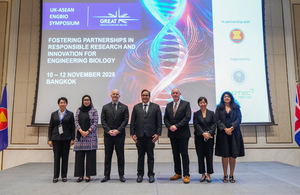UK-ASEAN Collaboration on Responsible Engineering Biology
UK and ASEAN Strengthen Collaboration on Responsible Engineering Biology for a Sustainable Bioeconomy

Bangkok, 10 November 2025 – The United Kingdom, in partnership with the ASEAN Secretariat and delivered by the National Center for Genetic Engineering and Biotechnology (BIOTEC) under the National Science and Technology Development Agency (NSTDA), convened a high-level symposium on “Fostering UK-ASEAN Partnerships in Responsible Research and Innovation for Engineering Biology” at Eastin Grand Hotel Phayathai, Bangkok.
The event promotes collaboration and knowledge exchange between the United Kingdom and ASEAN Member States in the field of Engineering Biology (EB), emphasising Responsible Research and Innovation (RRI) to ensure that applications of engineering biology are safe, ethical, inclusive, and sustainable for society and the environment. Opening remarks were delivered by Mr. David Thomas, Chargé d’Affaires, British Embassy Bangkok; Dr. Punpermsak Aruni, Assistant Permanent Secretary, Ministry of Higher Education, Science, Research and Innovation (MHESI), Thailand; and Dr. Surina Mokhtar, Head of S&T Division, the ASEAN Secretariat.
Marking the third collaboration between the UK and ASEAN in this domain, and funded by the UK Government, the event brought together over 50 participants consisting of policymakers, funding agencies, academia, startups, and industry representatives from ASEAN Member States and the UK. It served as a platform for experts to exchange insights and define strategic directions for leveraging engineering biology to advance the bioeconomy in ASEAN, while addressing social and ethical considerations.
Key Highlights:
- Day 1 (10 Nov): Focused on the context and significance of engineering biology in the UK and ASEAN, responsible research practices, and standards in EB. Featured speakers included Professor Chris Johnson, Chief Scientific Adviser, UK Department for Science, Innovation and Technology, and Dr. Kanyawim Kirtikara, President of Thailand Academy of Science and Technology.
- Day 2 (11 Nov): Explored gene-editing techniques and agricultural applications, alongside policy discussions, ethical considerations, and investment opportunities in EB.
- Day 3 (12 Nov): Examined EB applications in healthcare and precision medicine, as well as future opportunities and challenges for EB in ASEAN.
The seminar underscored the potential for advancing engineering biology, policy development, and workforce capacity across Thailand and the ASEAN region, while reinforcing UK-ASEAN cooperation to expand future collaborative initiatives.